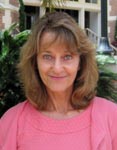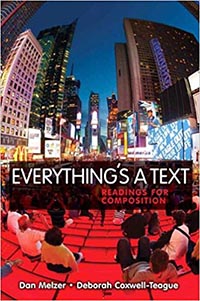 For Deborah Coxwell-Teague an answer to the question "What is a text?" can be found in the title of her new book: Everything's a Text. Following four years of research, writing, and collaborating with Dan Melzer—who was a doctoral student in the department nearly 10 years ago—Coxwell-Teague's goal with the book is to help students "learn how to read, analyze, respond to, and write about the texts that bombard them each day."
For Deborah Coxwell-Teague an answer to the question "What is a text?" can be found in the title of her new book: Everything's a Text. Following four years of research, writing, and collaborating with Dan Melzer—who was a doctoral student in the department nearly 10 years ago—Coxwell-Teague's goal with the book is to help students "learn how to read, analyze, respond to, and write about the texts that bombard them each day."
She uses examples such as websites, television shows, movies, blogs, billboards as well as essays, short stories, and poetry, among others, to illustrate a statement from the publisher's description of Everything's a Text, scheduled for a November release from Pearson: "To be literate today means more than being a strong reader and writer of print texts."
She and Melzer "made a point to include selections in the book that first- and second-year college students would be likely to find engaging. Our goal was not to design a text that would impress other professors—though, of course, we hope it will."
 According to the publisher's description, "assignment options range from reflections, textual analyses, and researched arguments to documentary films and poster campaigns to give students practice at producing a full range of texts in circulation today."
According to the publisher's description, "assignment options range from reflections, textual analyses, and researched arguments to documentary films and poster campaigns to give students practice at producing a full range of texts in circulation today."
The process of writing with Melzer, who earned PhDs in both Rhetoric and Creative Writing, was "a huge treat," she says, adding that they have long wanted to work on a project together. "Our voices and writing styles are quite similar, as are our ideas about teaching writing, so collaboratively authoring Everything's a Text worked out very smoothly."
As director of the First-Year Composition Program, Coxwell-Teague works with the 140-plus teaching assistants in the department, a group she calls "fabulously smart, hard-working, and a true pleasure to work with."
New teaching assistants in the department attend a six-week summer training program session before beginning their teaching duties. This year, twenty-five TAs completed the full program—"labeled 'boot camp' by the TAs who experience it," Coxwell-Teague says—and another fifteen with previous teaching experience joined for the last week of the program.
In addition to writing Everything's a Text and training and supervising the department's teaching assistants, Coxwell-Teague has updated On Writing, the last book that former FSU professor Wendy Bishop authored before her death in 2003. The first edition of the book included essays written by seniors and graduate students. In the two subsequent editions, Coxwell-Teague has included essays written by students in first-year composition courses at FSU.
"I also made a concerted effort to update the latest edition of the book by including essays that focus on new media and ways recent technologies have affected our lives and the way we compose," she says.
Coxwell-Teague has also co-authored an article, "Advanced Placement English and College Composition: A Comparison of Writing at the High School and First-Year College Levels," which will be included in the second edition of What Is College-Level Writing? (National Council of Teachers of English, 2010). She wrote the article with two friends, Ron Lunsford (a teacher at the University of North Carolina-Charlotte) and John Kiser (a retired high school teacher and administrator, currently serving as an AP consultant), and admits that her opinions on AP English differ quite a bit from the ones that her co-authors have on the subject.
"Writing the article with them was, as one might expect, a challenge, because I was not in agreement with them on various issues," Coxwell-Teague says. Instead of glossing over those differences, however, the book's editors asked the three authors to accentuate those differences, and to include in the article a dialogue among the three on both AP and college-level compositions.
"The result was interesting and thought provoking," Coxwell-Teague says, "and Ron and John remain my good friends."
